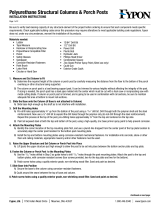
Page 1 of 1
General Installation Notes
Any adhesives, sealants, fillers or paint used must be compatible with the material that is being installed (see manufacturer’s recommendations in the
Finishing and Adhesives section below). Always use corrosion-resistant mechanical nails or screws along with manufacturer’s recommended adhesive
product when installing all Fypon products. This combination provides a secure, long-lasting bond. Countersink all fasteners about
1
/
8
” and fill with
product compatible filler. Exterior installations should be finished using a manufacturer’s recommended caulk to prevent water infiltration behind
siding, windows and doors. Some exterior installations, in particular new construction before siding is applied, may require a J-channel and/or
flashing to prevent water infiltration. Installers must determine which installation technique is best for the specific situation.
Finishing and Adhesives
Polyurethane (PUR) – Fypon polyurethane products are factory primed. Depending on product location, always use interior/exterior-grade, PUR
compatible adhesives, sealants, and fillers when installing Fypon products. Consult the manufacturer’s recommendations for your particular
climate and the substrate you are installing to.
Cellular PVC – Depending on product location, always use interior/exterior-grade, PVC compatible adhesives, sealants, and fillers when installing
Fypon products. Consult the manufacturer’s recommendations for your particular climate and the substrate you are installing to. If painting is
desired, a 100% acrylic latex paint with a Light Reflectance Value (LRV) of 55% or higher must be used. Applying paint with an LRV of 54% or
lower will void the warranty.
IMPORTANT:
Please read these installation guidelines thoroughly before beginning installation. Please note that these guidelines are provided only to assist with the installation of Fypon moulding
and millwork products. Modified procedures may be required in order to meet specific situations, unique applications and local building codes. The manufacturer does not, under any
circumstances, warrant the installation of its products. Be sure to wear appropriate protective clothing, gloves and safety glasses when working with any tools. Installer should check
for and relocate all electrical wiring within the proposed installation area, as needed (be sure to disconnect all electric power before working with any electrical wiring and follow all
applicable local electrical codes and safety procedures).
Fypon, Ltd. 1750 Indian Wood Circle Maumee, Ohio 43537 1.800.446.3040 www.fypon.com
TM
Crossheads for Windows and Doors
FABRICATION
All Fypon door and window crossheads are measured from and ordered in relationship to the breastboard dimension.
It is architecturally acceptable to install crossheads slightly wider than the opening as long as the overhang is even on both sides.
Materials needed:
• Safety glasses
• Tape measure
• Hammer or Pneumatic Nailer
• Handsaw
• Nail Countersink
• Corrosion-Resistant Fasteners
• Caulk Gun
• Polyurethane Compatible Adhesive
• Polyurethane Compatible Filler
• Sandpaper
• Pencil
• Latex Paint
Special Order; Fabricated
Fypon can provide custom crossheads in one piece when the requested size is smaller than the largest standard size. Widths larger than the
largest standard size will ship in two or more pieces.
Job-site Fabrication of Stock Size
1. For stock crossheads that need to be shortened to fit your application, take the desired width of the crosshead and divide the dimension in
half. Next, measure from the right of the crosshead breastboard the "half" dimension. Mark the measurement using a pencil and framing
square. Do the same from the left side of the crosshead breastboard. Cut the crosshead at the pencil marks.
2. Place the right and left crosshead pieces on top of the entrance opening, aligning the outer edge of the crosshead breastboard with the
outer edge of the entrance opening or pilasters. Securely fasten each crosshead through the breastboard using adhesive and fasteners.
3. To cover the seam at the center of the crosshead, overlay the keystone onto the crosshead and center it over the opening. Fasten the
keystone to the crosshead using adhesive and fasteners. Countersink fastener holes and fill for a finished look.
/




